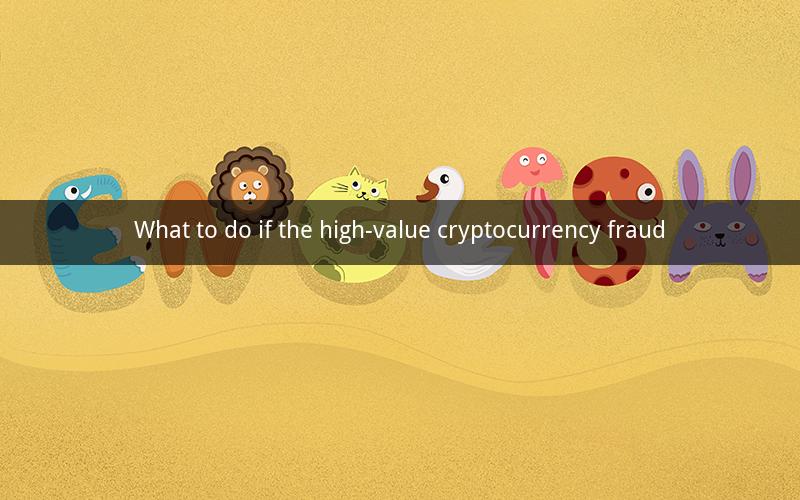
Contents
1. Introduction to High-Value Cryptocurrency Fraud
2. Identifying High-Value Cryptocurrency Fraud
3. Immediate Actions to Take
4. Contacting Authorities
5. Protecting Your Identity and Assets
6. Documenting the Incident
7. Preventive Measures
8. The Role of Blockchain Technology
9. The Importance of Cybersecurity Education
10. Conclusion
1. Introduction to High-Value Cryptocurrency Fraud
High-value cryptocurrency fraud refers to fraudulent activities that involve significant financial loss, typically targeting individuals or entities with substantial cryptocurrency holdings. As cryptocurrencies gain popularity, the number of fraudulent cases has been on the rise, posing significant risks to investors. This article aims to provide guidance on what to do if you become a victim of high-value cryptocurrency fraud.
2. Identifying High-Value Cryptocurrency Fraud
It is crucial to recognize the signs of high-value cryptocurrency fraud to take immediate action. Some common red flags include:
- Unusually high returns or promises of unrealistic profits
- Unverified or unregistered platforms or individuals offering cryptocurrency services
- Requests for confidential information or funds transfers to untrusted addresses
- Pressure to act quickly or invest large sums of money
- Phishing emails or fake websites resembling legitimate platforms
3. Immediate Actions to Take
When you suspect high-value cryptocurrency fraud, it is essential to act swiftly to minimize potential losses. Here are some immediate actions you should consider:
- Cease all transactions with the fraudulent entity
- Report the incident to your cryptocurrency wallet provider or exchange
- Change your passwords and enable two-factor authentication
- Monitor your bank accounts and credit reports for suspicious activity
4. Contacting Authorities
Contacting authorities is crucial in investigating high-value cryptocurrency fraud. Here’s how you can do it:
- Report the incident to the relevant law enforcement agency in your jurisdiction
- Provide them with all the necessary information, including transaction details, communications with the fraudulent entity, and any other relevant evidence
- Follow their guidance and cooperate fully during the investigation process
5. Protecting Your Identity and Assets
To protect your identity and assets, consider the following measures:
- Inform your financial institutions about the fraudulent activity
- Place a fraud alert or credit freeze on your credit reports
- Monitor your financial accounts for unauthorized transactions
- Seek legal advice to understand your rights and options
6. Documenting the Incident
Documenting the incident is essential for both personal records and potential legal action. Here’s how you can do it:
- Keep a detailed record of all communications with the fraudulent entity, including emails, messages, and phone calls
- Note down the dates, times, and nature of each communication
- Collect and preserve any physical evidence, such as documents or screenshots
7. Preventive Measures
To prevent falling victim to high-value cryptocurrency fraud, consider the following preventive measures:
- Conduct thorough research on cryptocurrency platforms and individuals before engaging in transactions
- Stay informed about the latest cybersecurity threats and best practices
- Use reputable cryptocurrency wallets and exchanges
- Avoid sharing sensitive information with unknown parties
8. The Role of Blockchain Technology
Blockchain technology can play a significant role in combating high-value cryptocurrency fraud. Its decentralized nature makes it difficult for hackers to manipulate the system. However, blockchain does not eliminate the risk of fraud entirely. Users must remain vigilant and follow best practices to protect their assets.
9. The Importance of Cybersecurity Education
Cybersecurity education is crucial for individuals and organizations involved in cryptocurrency. By understanding the risks and taking appropriate measures, you can significantly reduce the chances of falling victim to high-value cryptocurrency fraud.
10. Conclusion
High-value cryptocurrency fraud is a serious issue that can lead to significant financial losses. By identifying the signs of fraud, taking immediate action, contacting authorities, and implementing preventive measures, you can protect your assets and contribute to the fight against this type of fraud. Stay informed, remain vigilant, and be proactive in safeguarding your cryptocurrency investments.
Questions and Answers
1. What should I do if I receive a suspicious email asking for my cryptocurrency wallet password?
Answer: Do not click any links or provide any information. Instead, report the email to your wallet provider and change your password immediately.
2. Can I reverse a cryptocurrency transaction if I realize I’ve been scammed?
Answer: Unfortunately, reversing a cryptocurrency transaction is nearly impossible once it has been confirmed on the blockchain. Report the incident to your wallet provider or exchange.
3. How can I tell if a cryptocurrency platform is legitimate?
Answer: Research the platform’s reputation, check if it is registered with a regulatory authority, and look for positive reviews from trusted sources.
4. Should I invest in cryptocurrencies if I’m not familiar with the technology?
Answer: It’s essential to educate yourself before investing in cryptocurrencies. Consider seeking advice from a financial advisor or conducting thorough research.
5. What should I do if I suspect a friend or family member is involved in cryptocurrency fraud?
Answer: Encourage them to seek legal advice and report the incident to authorities. Provide support and resources to help them understand the risks involved.
6. Can I recover my cryptocurrency if I’ve been scammed?
Answer: Recovery is unlikely, but you can report the incident to law enforcement and your wallet provider. They may assist in tracking down the scammers.
7. Is it safe to store large amounts of cryptocurrency on an exchange?
Answer: Exchanges can be targets for hackers. Consider using a reputable cryptocurrency wallet to store your assets and enable two-factor authentication for added security.
8. What are the common types of high-value cryptocurrency fraud?
Answer: Common types include phishing scams, Ponzi schemes, fake investment opportunities, and ransomware attacks.
9. How can I protect my identity when engaging in cryptocurrency transactions?
Answer: Use strong, unique passwords for each account, enable two-factor authentication, and avoid sharing sensitive information with unknown parties.
10. Can I recover my cryptocurrency if I’ve lost access to my wallet?
Answer: Unfortunately, you cannot recover your cryptocurrency if you’ve lost access to your wallet. Ensure you have a backup of your private keys to prevent such situations.